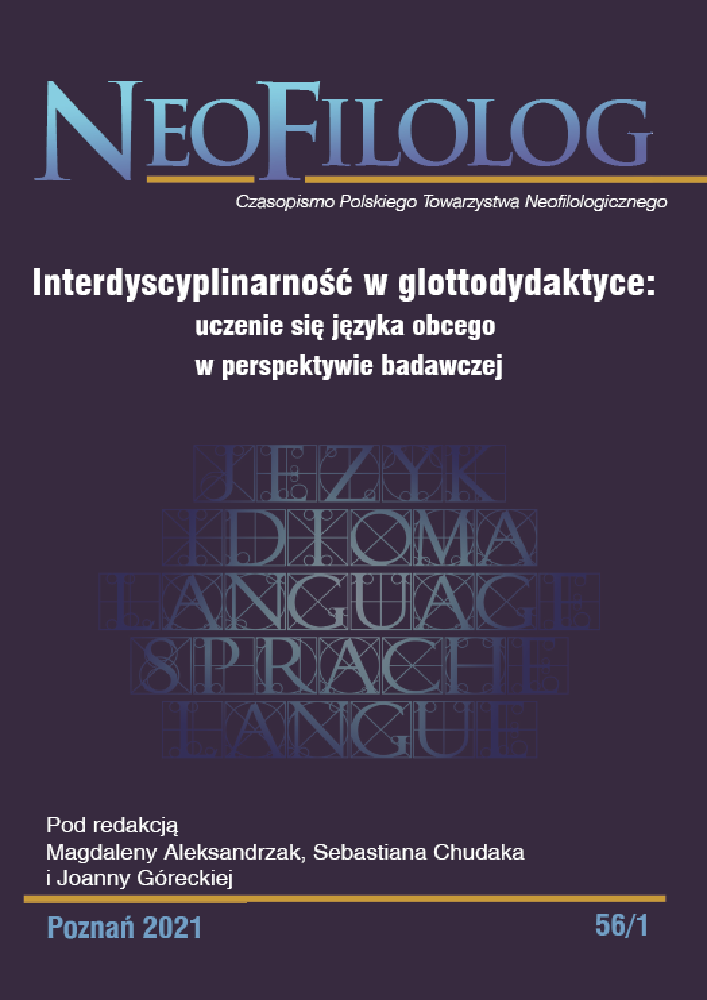Abstract
The article discusses a case study focusing on the students’ task of analyzing expressing opinions in Polish and English TV discussions. The written observation task is performed as a final requirement to receive credit for the course of interaction analysis, during which the second-year students of applied linguistics are introduced to the basic methods of conversation analysis. I use document analysis of students’ discourse to distinguish the main tendencies in performing the task by the students.
The aim of the research presented in the paper is assessing the students’ ability to use conversation analysis in observing different ways of expressing opinion in selected Polish and American TV discussions. I especially focus on evaluating the students’ skill of unmotivated looking at the ways of expressing opinions in TV discussions. This phenomenological observation requires suspending the researcher’s personal views and assumptions concerning the meaning of actions in interaction. The main aim of conversation analysis is discovering the meaning of communicative actions from the perspective of a talk participant. If applied appropriately, this kind of observation allows student-researchers to avoid a tendency to rely on stereotypical evaluations in the analysis of interactions.
References
Barraja-Rohan A. M. (2011), Using conversation analysis in the second lan-guage classroom to teach interactional competence. „Language Teach-ing Research”, nr 15 (4), s. 479-507.
Bowen G. A. (2009), Document Analysis as a Qualitative Research Method, „Qualitative Research Journal” nr 9 (2), s. 27-40.
Boyle R. (2000), Whatever happened to preference organization. „Journal of Pragmatics”, nr 32, s. 583-604.
Doehler S. P., Wagner J., González Martinez E. (2018), Longitudinal studies on the organization of social interaction. Basingstoke, Hampshire: Palgrave Macmil-lan.
Górecka J., Wojciechowska B. (2013), Rozwijanie rozumienia publicystycz-nych audycji radiowych: specyfika etapu poprzedzającego słuchanie. „Neofilolog”, nr 40 (1), s. 59-77.
Heritage J. (1984), Garfinkel and Ethnomethodology. Hoboken: Wiley.
Hutchby I., Wooffitt R. (1998), Conversation analysis: Principles, practices, and applications. Cambridge: Polity Press.
Kasper G., Rose K. R. (2002), Pragmatic development in a second language. Language learning monograph series. Oxford: Blackwell.
Kasper G., Wagner J. (2018), Epistemological Reorientations and L2 Interac-tional Settings: A Postscript to the Special Issue. „The Modern Lan-guage Journal”, nr 102, s. 82-90.
Markee N. (2000), Conversation analysis. Second language acquisition re-search: theoretical and methodological issues. Mahwah, N.J., London: L. Erlbaum Associates.
Pomerantz A. (1984), Agreeing and disagreeing with assessments: Some features of preferred/dispreferred turn shapes, (w:) Atkinson J. M., Heritage J. (red.), Studies in emotion and social interaction. Structures of social action: Studies in conversation analysis. Cambridge: Cambridge University Press, s. 57-110.
Rapley T. (2007), Doing conversation, discourse and document analysis. Los Angeles, London, New Delhi, Singapore, Washington, DC, Melbourne: SAGE.
Seedhouse, P. (2004), The interactional architecture of the language classroom: A conversation analysis perspective. Malden, Mass., Oxford: Blackwell.
Sidnell J. (2014), The architecture of intersubjectivity revisited, (w:) Enfield N., Kockelman P., Sidnell J. (red.), The Cambridge Handbook of Linguistic Anthropology. Cambridge: Cambridge University Press.
Tannen D. (1998), The argument culture: Changing the way we argue and debate. London: Virago.
Vaismoradi M., Turunen H., Bondas T. (2013), Content analysis and thematic analysis: Implications for conducting a qualitative descriptive study, „Nursing & health sciences”, nr 15 (3), s. 398-405.
Wagner J., Pekarek-Doehler S. (2006), Progressive bricolage of TCUs in second language talk. ICCA international conference on conversation analysis, Hel-sinki.
Wierzbicka A. (2003), Cross-Cultural Pragmatics: The Semantics of Human Interaction. Mouton Textbook. Berlin, New York: Mouton de Gruyter.
NETOGRAFIA
https://www.hoover.org/research/unconventional-wisdom-torture-and-war-terror [DW 31.01.2020]
License
Copyright (c) 2021 Agnieszka Nowicka

This work is licensed under a Creative Commons Attribution-NoDerivatives 4.0 International License.
Authors
Authors of texts accepted for publication in Neofilolog are required to complete, sign and return to the Editorial team’s office the Agreement for granting a royalty-free license to works with a commitment to grant a CC sub-license.
Under the agreement, the authors of the texts published in Neofilolog grant Adam Mickiewicz University in Poznań a non-exclusive, royalty-free license and authorize the use of Attribution-NoDerivatives 4.0 International (CC BY-ND 4.0) Creative Commons sub-license.
The authors retain the right to the free disposal of the work.
Users
Interested Internet users are entitled to use works that have been published in Neofilolog since 2017, under the following conditions:
▪ attribution – obligation to provide, together with the distributed work, information about the authorship, title, source (link to the original work, DOI) and the license itself.
▪ no derivatives – the work must be preserved in its original form. Without the author's consent, it is not possible to distribute the modified work in the form of translations, publications, etc.
Copyrights are reserved for all texts published since 2017.
Miscellaneous
Adam Mickiewicz University in Poznań retains the property right as a whole (layout, graphic form, title, cover design, logo etc.).
